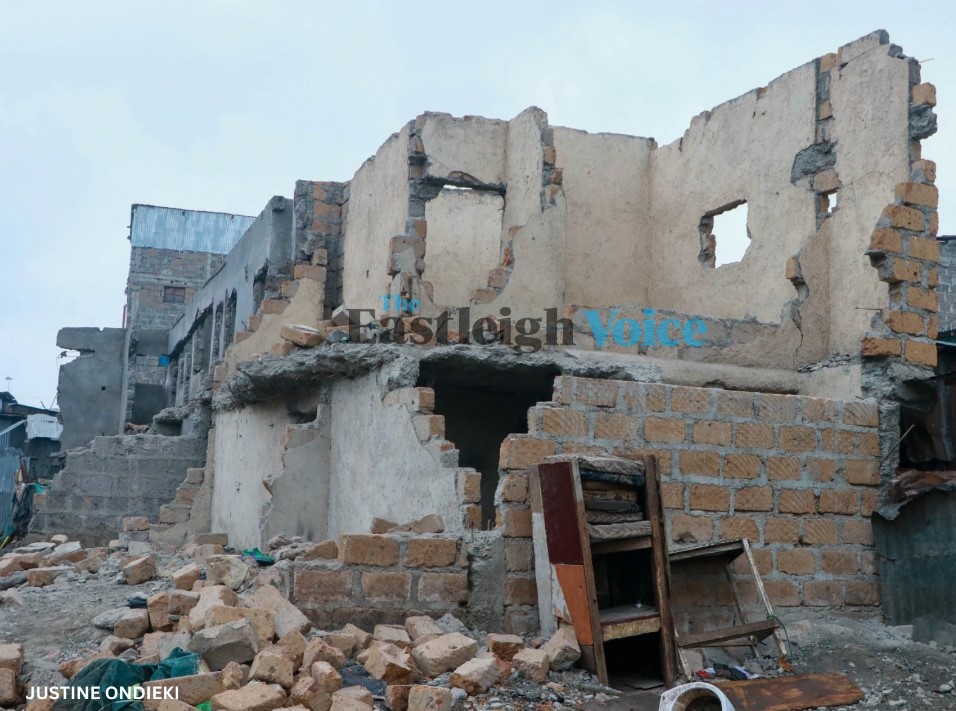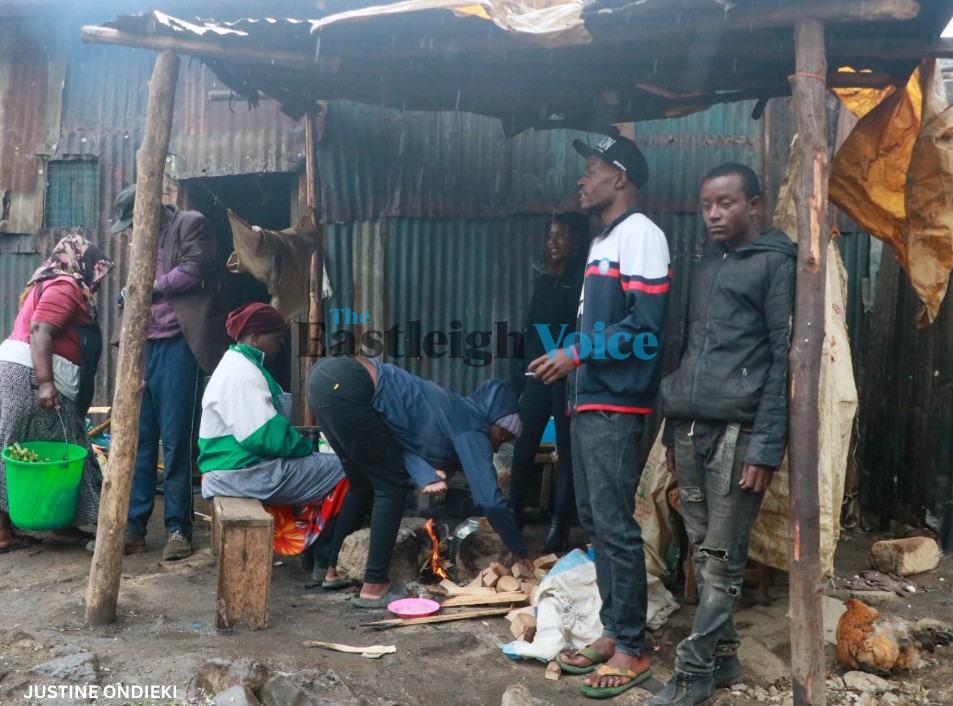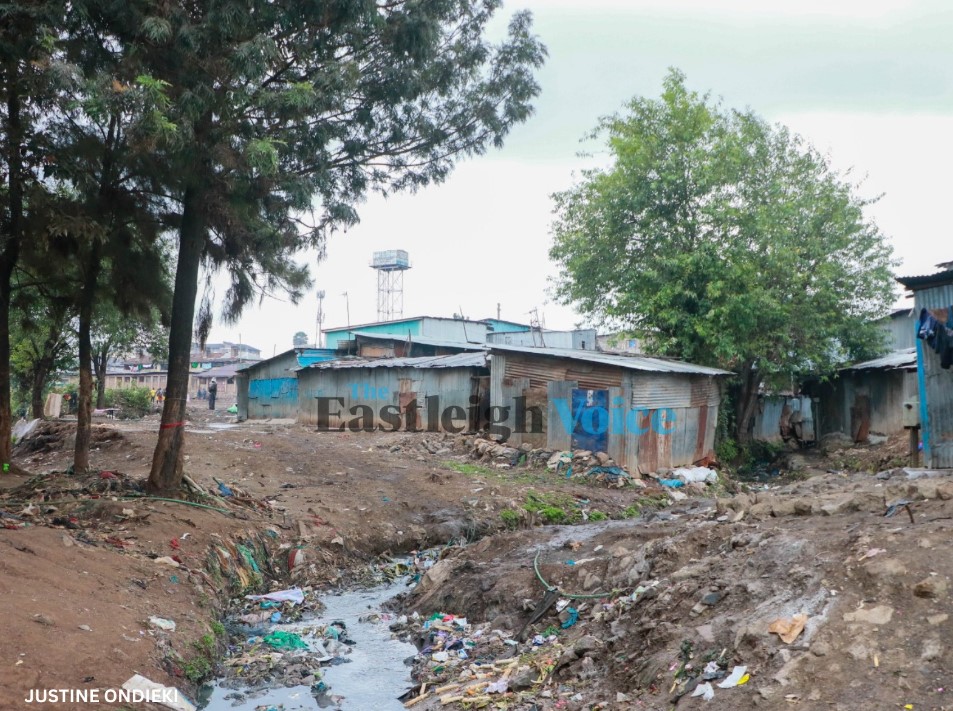Kitui Village residents decry poor living condition after state demolished their homes
Before the demolition, I had a stable business that allowed me to support my family.
Every time the skies darken, and the first raindrops fall, Regina Murimi, a resident of Kitui Village in Kamukunji Constituency, is gripped by fear and anxiety. The rumble of the clouds brings back haunting memories of the March and May floods, igniting her deep worry that another disaster might be on the horizon.
The floods had been devastating enough, but they were followed by a demolition that stripped Regina of her home. Now, months later, she finds herself in a bleak and lonely situation, with no support and the heavy burden of caring for her grandchildren. The uncertainty and hardship weigh heavily on her, as she struggles to hold her family together amid the chaos.
More To Read
- Fire guts several houses at Kanuku informal settlement in Kamukunji’s California Ward
- Paved road brings new life to Kamukunji’s Kitui village, residents push for street lights next
- Creativity in crisis: Kitui village artisans fight to save Nairobi’s craft heritage after market fire
- Trapped by rains: Nairobi’s flood victims face another season of uncertainty
- Kitui Village residents urge urgent action as rains delay ongoing road construction
- Christmas cheer for Kitui Village fire survivors as Eastleigh Voice offers support
“Life has become incredibly tough for me and my family. Before the demolition, I had a stable business that allowed me to support my family. Now, I have nothing left and can't seem to rebuild my life. When it rains, it feels like the sky is mocking our misery. We’re left exposed, with no shelter and no one to turn to for help.”
Lost in thought, Murimi points to the space where her house once stood and the washroom facility, she had built to spare her family from the indignity of using flying toilets and paying for public bathrooms. Now, their only refuge is an abandoned, half-demolished building and a river that hides their shame.
 Building demolished at Kitui village in Kamukunji sub-county captured on September 4 (Photo: Justine Ondieki)
Building demolished at Kitui village in Kamukunji sub-county captured on September 4 (Photo: Justine Ondieki)
"Many households are now relying on buckets and the demolished buildings for their needs because the available public toilets are too far from us. What we earn is barely enough to cover the cost of public toilets for the entire household, especially when we can barely keep a roof over our heads."
Like many others, Murimi missed out on the government aid that was promised. All she heard were rumours, but she never saw any real support. Now, she and her family are living in one of the few houses by the river that wasn’t demolished. They’re squeezed into a tiny, single room with a leaky roof, trying to make the best of a difficult situation.
A spot check by The Eastleigh Voice uncovered that while many houses weren’t entirely brought down, leaving piles of debris scattered about, some only had their roofs stripped away, leaving the walls still standing.
This partial demolition has created new problems for the community. The empty, roofless structures have become risky havens for criminal activities, intensifying fears among residents. Many people are now worried about their safety, as these abandoned buildings have turned into unsettling hideouts, adding to the already heavy burden of living in such precarious conditions.
Polycarp Ashioni, a resident of Kinyago, experienced a devastating loss when a demolition flattened his home and all his important documents. Unlike the floods, which the family managed by waiting for the waters to recede before returning home, the demolition was sudden and thorough, leaving nothing intact.
“The demolition happened while I was away,” Ashioni said. “Everything was destroyed, including all our important documents and our children’s birth certificates. This threw my family completely off balance.”
 Residents of Kitui village in Kamukunji sub-county, Nairobi (Photo: Justine Ondieki)
Residents of Kitui village in Kamukunji sub-county, Nairobi (Photo: Justine Ondieki)
With nowhere to turn, Ashioni and his family had to endure the harsh conditions of living without a home. Although the government had promised to cover three months of rent to help displaced families, Ashioni's experience was far from supportive.
“The government promised us three months’ rent, but I only received 10,000 shillings once after that, there was no further assistance. Honestly, I didn't know how to manage or balance the situation with such limited support.”
Since the demolition, Ashioni has struggled to move forward. With mounting bills and a lack of job opportunities, he has been forced to live from hand to mouth. The pressure of trying to replace the lost documents has compounded his difficulties. For Ashioni, life will never be the same again.
Daniel Chalo Kaloki, a victim of both flooding and demolition in Kinyago, reveals that over 300 people were impacted, yet not everyone received the promised compensation.
“We had a situation where our names were listed to receive food aid, but some people who weren’t affected ended up benefiting from it,” Kaloki said. “I only received 10,000 shillings, which barely covered the deposit and rent. After that, I was left stranded.”
Kaloki emphasizes that the demolitions were rushed and criticizes the government for failing to provide a solution beforehand. He expresses concern about ongoing insecurity and fear of future demolitions.
 (Photo: Justine Ondieki)
(Photo: Justine Ondieki)
“It’s unjust to demolish people’s homes without offering a lasting solution,” he stated. “We needed a permanent resolution. There are still people living outdoors, trying to keep warm by lighting fires because they have nowhere to go.”
On May 6th, during his visit to Kiamaiko, President William Ruto reassured the public of the government's commitment to providing adequate food for all families affected by the floods. He announced that funds have been set aside to ensure that those impacted receive necessary food supplies.
“The government will stand by you. No one will go to bed hungry, and no child will go to bed hungry. We have allocated enough money to buy food for everyone affected by the floods in Nairobi and across Kenya,” President Ruto stated.
Ruto assured the residents that each affected family would be given 10,000 shillings to help with securing alternative accommodation for three months while a long-term solution is developed.
According to the National Disaster Operations Centre (NDOC), between March 1 and May 16, 2024, the heavy rains and floods resulted in an estimated 291 deaths, 188 injuries, and 75 people reported missing. Additionally, 278,380 individuals (comprising 55,676 families) have been displaced, and nearly 412,763 people (82,552 families) have been affected by the disaster.
Top Stories Today











































